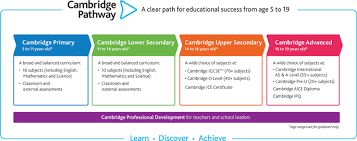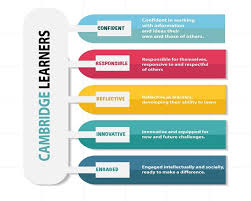FAQ'S
1. What is IGCSE?
International General Certificate of Secondary Education (IGCSE) is a globally recognised qualification, taken at the Class 10 level, similar to the Class 10 examinations of the CBSE and ICSE . It is an international board that conducts examination at the end of school years, forms curriculum, suggest resources and methodologies.More than10,000 schools affiliated to it in 160 countries including India.
2. IGCSE examination is conducted by which board?
Cambridge Assessment International Education, U.K.
3. Who can appear for this curriculum?

Entry is possible at the level of grade 3, 6,7, 8,9 or 11, but the global trend favours grade 6 entry.
4. What are the benefits of studying with Cambridge International?
Cambridge Assessment International Education prepares school students for life, helping them develop an informed curiosity and a lasting passion for learning. They are part of the University of Cambridge.Cambridge international qualifications are recognised by the world’s best universities and employers, giving students a wide range of options in their education and career. As a not-for-profit organisation, they devote thier resources to delivering high-quality educational programmes that can unlock learners' potential.

5. Is it compulsory to study abroad after passing grade 10 from IGCSE? Is the qualification valid for Indian universities and boards?
IGCSE is recognized by all Indian boards and universities. An IGCSE student has an added advantage over other Indian students for studies abroad.
6. When is the IGCSE examination conducted?
Cambridge International conducts examination thrice a year-March[only for India], June and November.
7. How many subjects are there for IGCSE?
Cambridge International offers 70 subjects. Student can select from minimum five to maximum 10[or more] subjects as per his/her choice and future career options.
8. How are the subjects selected?
- Mathematics, Physics, Chemistry and Biology subjects offer a choice between core curriculum and extended curriculum.
- This gives students of all ability levels the freedom to choose subjects that are right for them and, thereby, the opportunity to score good grades.
- The core curriculum is an overview of the subject and is suitable for students who are expected to achieve grades C to G.The extended curriculum is, sort of, a specialization in that subject. It is more challenging and designed for students who are expected to achieve grades A+ to C.
9. How many subjects are offered by Gundecha Education Academy?
| List of Subjects+A2:E26 taught in Grade 6 | List of Subjects taught in Grade 7 | List of Subjects taught in Grade 8 | List of Subjects offered in Grade 9 | List of Subjects offered in Grade 10 |
|---|---|---|---|---|
| First language English | First language English | First language English | First language English | First language English |
| Second language Hindi, French | Second language Hindi, French | Second language Hindi, French | Second language Hindi | Second language Hindi |
| Marathi | Marathi | Mathematics | Mathematics | Mathematics |
| Mathematics | Mathematics | Physics | Physics | Physics |
| Physics | Physics | Chemistry | Chemistry | Chemistry |
| Chemistry | Chemistry | Biology | Biology | Biology |
| Biology | Biology | Environmental Management | Environmental Management | Environmental Management |
| Environmental Management | Environmental Management | Global studies-1 | Global studies-1 | Economics |
| Global studies-1 | Global studies-1 | Global studies-2 | Global studies-2 | Business Studies |
| Global studies-2 | Global studies-2 | Economics | Literature in English | Literature in English |
| Graded subjects: | Graded subjects: | Business Studies | Economics | Graded subjects: |
| (1) Skills and Catalyst | (1) Skills and Catalyst | (1) Skills and Catalyst | ||
| [fine arts, performing arts, moral values, general aptitude, SUPW]] | [fine arts, performing arts, moral values, general aptitude, SUPW] | [ moral values, general aptitude, SUPW]] | ||
| (2) Get Active [Physical Education] | (2) Get Active [Physical Education] | (2) Get Active [Physical Education] | ||
| (3) Digital Literacy | (3) Digital Literacy | |||
| Graded subjects: | Business Studies | |||
| (1) Skills and Catalyst | ||||
| [fine arts, performing arts, moral values, general aptitude, SUPW] | ||||
| (2) Get Active [Physical Education] | ||||
| (3) Digital Literacy | ||||
| Graded subjects: | ||||
| (1) Skills and Catalyst | ||||
| [ moral values, general aptitude, SUPW] | ||||
| (2) Get Active [Physical Education] |
10. Is there any system to guide students and parents for subject selection?
Cambridge international conducts a diagnostic test called as ‘Checkpoint exam’ for Math, science and English at the end of grade 8 and before the beginning of grade 9. A detailed report of the abilities, aptitude, errors etc. is provided by Cambridge international as checkpoint results. This serves as guideline for selecting the subjects.
11. How are the assessments taken at IGCSE section of Gundecha Education Academy?
Assessment is not limited to conventional written papers and they consist of a variety of tests e.g. oral and listening tests.
- The assessment is aimed at a wide ability range of students, with an eight-point grading scale, from A* to G, with A* being the highest.
- Internal Assessment in the form of tests are conducted in each of the above subjects along with assignments and projects.
- During one academic year students will undertake two trials of examinations.
12. Admission to IGCSE section in Gundecha Education Academy is advisable at which level?
The intake starts at grade 6, but entry is possible at the level of grade 7, 8 or 9. In general, earlier is better.
13. Is it possible to arrange a personal visit the IGCSE section?
Yes. A prior appointment is to be booked with the Admission officer via the school landline number[022-6640 1716]
14. What are the facilities available in IGCSE?
Air conditioned class rooms, comfortable seating, well equipped laboratories, audio visual room, wi-fi in each classroom , accessibility of internet to each student for research/reference work, paid canteen facility and optional, paid school bus service.
15. What is the student teacher ratio?
5:1. All are qualified, trained and experienced teachers.
16. What are the school timings?
Monday to Friday-8.25am to 3 pm, Two breaks-short and long breaks
